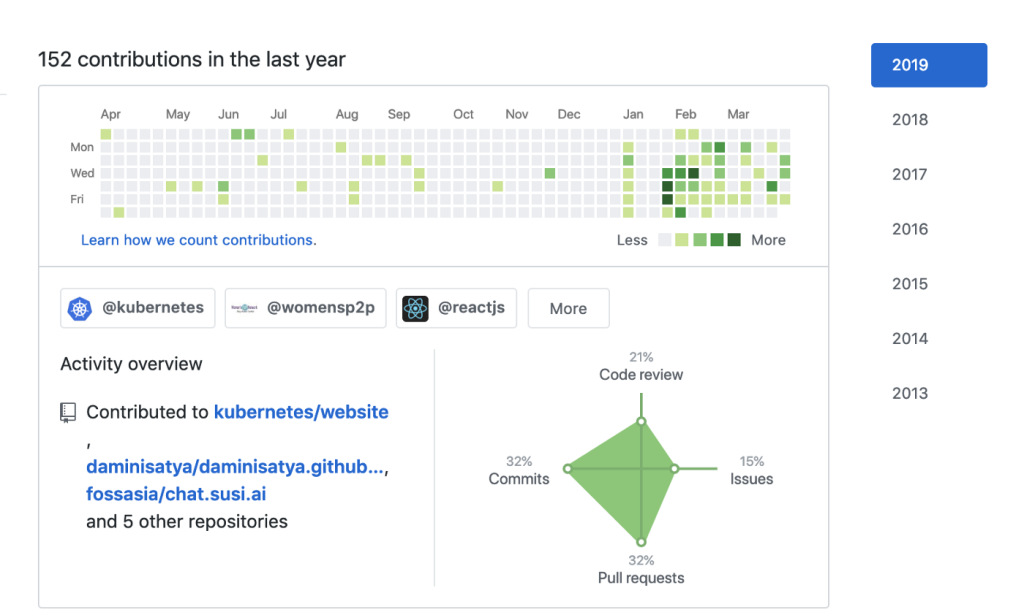
In 2016, Damini Satya was a computer science student in Hyderabad, India when she was accepted into Google Summer of Code (GSoC), working on LokLak. Her mentor for the project was based in Germany, which led to having meetings at some odd hours of the day and night to accommodate their different time zones! GSoC marked Damini’s first time working closely with colleagues based in other countries, an experience which has ended up serving her well as she’s joined a global company and continued to contribute to open source projects maintained by widely distributed teams.
Fast forward two years and she found herself working at Salesforce on the Community Cloud team, doing mostly front-end work on Aura. Seven months ago, she moved into a role in Infrastructure Engineering because she wanted to learn more about how data centers are built. So now, rather than working on visible components, she’s focusing on automating the processes necessary to get servers up and running.
This may sound like an atypical move, but Damini says learning about new things all the time is what keeps her focused.
So it may come as no surprise that during Salesforce’s Open Source Month in January, Damini decided to take a stab at learning the ropes of Kubernetes. There are a number of projects within Salesforce using Kubernetes, so while it’s not a part of her day job, she sees opportunities in knowing how to use it.
How does one get started learning about such a robust tool as Kubernetes? Damini’s method was to start setting up a Kubernetes cluster on her laptop. In following the docs to do so, she found some steps that weren’t properly linked or explained…so she opened pull requests to fix them!
Her contributions grew from there as she continued working through the entire codebase. She also took up the governance documentation for running a Kubernetes user group under mentorship of a Google employee. And she’s tiptoed back into her front-end comfort zone with a recent pull request for a feature that displays Horizontal Pod Autoscalers on the Kubernetes dashboard.
Once she started contributing, Damini says, she wanted to continue the streak.

And Kubernetes community members are taking notice. Last month, Damini received a Google Open Source Peer Bonus recognizing her numerous improvements to Kubernetes documentation! Next up? Damini wants to make a feature contribution to Kubernetes, and thinks that learning Kubernetes will keep her occupied for at least the next two years.
Being a part of Google Summer of Code instilled in Damini a deep love of open source software. Her advice for new or aspiring contributors? Don’t hesitate to ask a lot of questions. Make consistent contributions right from the start on low-hanging issues that are easy to tackle. And actively participate in the project’s Slack channel or other preferred method of communication.
Damini has found that everyone in the OSS community has been extremely helpful and welcoming, so she sees contributing as a way to give back to the community that has given so much to her.
Beyond Kubernetes, Damini has always been a huge fan of Linux and wants to contribute to Linux Kernel some day.
Keep an eye out for this open source enthusiast in the months to come. A 2018 Grace Hopper Celebration speaker, Damini has talks in the works for multiple conference this year as well, and she was also featured in STEMher Magazine in December 2018. Damini is an alumni of FOSSASIA, Asia’s Open Technology Organization. She is passionate about mental health and is creating Elsa, an AI conversational agent aimed at improving mental health for women. You can follow her on Twitter to see what she’s working on next as she continues on her never-ending learning journey.
Want to kick-start your own open source career? You have one more day to apply for Google Summer of Code 2019! You can see all of the Salesforce Open Source projects on our organization page or hit us up at oss-gsoc@salesforce.com with your ideas.






